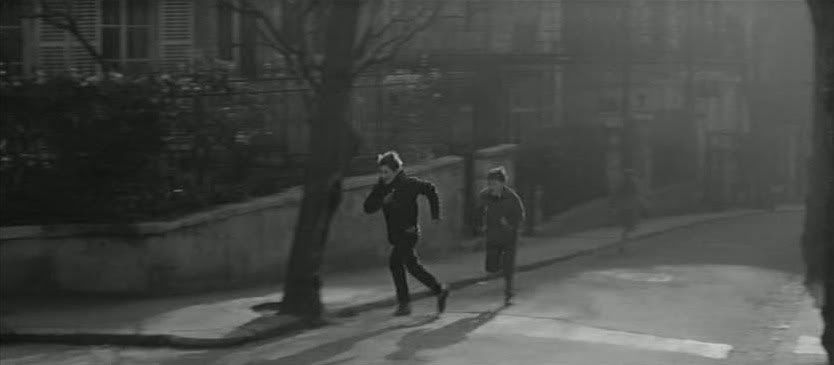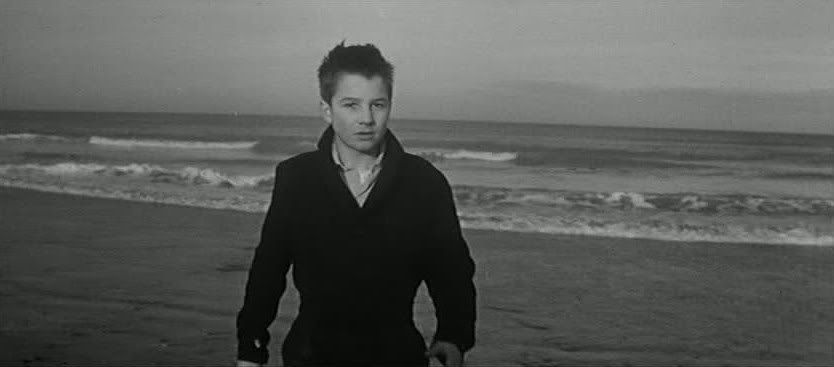
François Truffaut's first feature, The 400 Blows, is one of the seminal and defining works of the French New Wave, and with good reason. This stripped-down story of a misbehaving Parisian boy is deeply moving, warm and funny, a profound and enduring humanist statement. Antoine Doinel (Jean-Pierre Léaud) is a young boy who, struggling against his parents' indifference and his teachers' authoritarianism, continually gets in trouble at school and at home. His parents are familiar types: his mother (Claire Maurier) a middle-aged beauty clinging to her youth and sexiness, alternately scolding and coddling the confused Antoine, and his father (Albert Rémy) a joker, a goofball, forever stalled in middle management at his job due to lack of education. The family lives in a small apartment so cramped that Antoine can't even fully open the door to his room, since the bed blocks it; he can crack the door only enough to barely squeeze out.
Antoine's mother is introduced coming home from work, taking off her stockings, stretching her legs so that her skirt rides up, as she wearily scolds Antoine for forgetting to do some shopping for her. Truffaut emphasizes her sexuality, her bare legs and the curves beneath her tight sweater, juxtaposing her womanly vivaciousness against the aura of an exhausted working woman and a frustrated, ill-tempered mother. As soon as Antoine runs out the door on his errand, she admires herself in a mirror, posing as though for photographs, reflecting her self-centered interest in herself over her son. Antoine's father, meanwhile, jokes and laughs with his son, but he's equally frustrated with Antoine's inability to behave or do well in school, and his lighthearted demeanor is often shattered by bouts of anger and discipline. Antoine is living in an unstable and unhappy home. His father's jokes only irritate his mother, especially since the banter often has a sarcastic undercurrent that suggests he thinks she's unfaithful — a suspicion that proves to be true, as Antoine finds out later when, cutting school one day, he sees his mother with another man. The relationship between mother and son becomes one of strange complicity, as the mother tells Antoine that they'll each keep "secrets" between themselves: she doesn't mention what he saw, but it's obviously on her mind.
The issue of class is developed further when Antoine goes to stay with his school friend René (Patrick Auffay), whose family is rich and lives in a tremendous house with so many rooms that Antoine can hide in one without anyone ever finding him. Antoine is stunned by the size of this house in comparison to his own family's cramped apartment, but the family relations are remarkably similar: René's mother and father hardly see each other and are rarely even home at the same time. The kids are basically left to themselves, and they respond by doing whatever they want, trying to become independent. In practice, though Antoine talks of getting a job and supporting himself, the kids mainly steal whatever they can get their hands on, go to the movies, and run through the streets of Paris without aim.

The film reflects this juvenile aimlessness in its loose, off-the-cuff aesthetics. Shot largely in the streets of Paris with the fast, low-budget methods that would become one of the defining characteristics of the early New Wave, The 400 Blows captures Antoine's yearning for freedom, the playful spirit of fun that drives these kids. In one memorable sequence, Truffaut's camera follows the class, often from a high angle, as they're led on a jogging expedition through the city by a gym teacher. As the clueless teacher jogs at the front of the line, the kids behind him peel off and run off together until there are only a couple of students actually following the teacher anymore. In another sequence, Antoine and René sit in the cinema, captured in a two-shot that fixes their enraptured gazes, their hypnosis by the screen, their eyes wide and staring, much like Truffaut and his friends of the time, all of them compulsive moviegoers who would, like Antoine, rather hole up in a movie theater for hours at a time than engage with the responsibilities and troubles of the outside world.
The cinema also figures in the one sequence that shows Antoine and his family actually in harmony, enjoying themselves for a change — a fleeting moment of pleasure built on Antoine's lies. The family plans to go out to see Paris Belongs To Us — later the first film of Jacques Rivette, at this point actually still embroiled in its troubled shoot — and their night of laughter and good humor provides one of the few happy memories of family and home life that Antoine will ever have. His parents seem happy, flirting with one another and laughing, and on the way home Antoine sits in the back seat of the car, between them, laughing at nearly everything they say, not because it's funny but because he's so happy to see them like this, a rare occurrence in this family.
This brief, cheerful interlude remains an oasis in the desert of Antoine's life, as he continues to act out and lie, to steal and cheat, and eventually his parents simply give up on him, relinquishing their care for him and sending him to a juvenile detention center after a night spent in jail along with criminals and prostitutes. It's all leading towards the film's famous finale, an extended tracking shot of Antoine running along a beach, playing at the water's edge, and then that iconic final freeze frame of Antoine looking into the camera, his eyes uncertain, searching. He's reached the end of the world, perhaps, the place where the land falls off into the water — and also the place he'd dreamed, childishly, of running away to with René, to start a boat business and make their own way in the world — and now he looks back toward the camera and beyond it, as though wondering where he's going to go next. It's an extraordinary image, impossible to forget, the endless ocean behind Antoine simultaneously conveying limitless possibilities and nowhere left to run. Léaud's obviously deep identification with this character helps to communicate the intensity of his confusion and uncertainty at this point. Léaud, so young here, so fragile and also so bold and swaggering, would eventually grow up onscreen in the films of the New Wave, and it seems to be that future he's looking towards, trying to imagine who he'll be next, what films he'll live next.









0Awesome Comments!